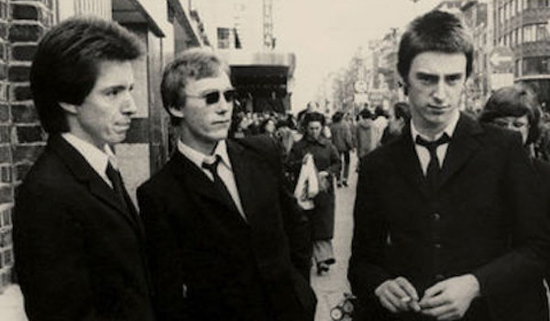
Neither as bracingly rude as the Sex Pistols nor as persuasively political as the Clash, the Jam didn’t translate Stateside as quickly as its peers in Britain’s punk-rock origin story. Signed to major label Polydor from the start, these three youngsters from Woking, Surrey, were classicists rather than rebels, in love with the Who, the Kinks and Tamla Motown northern soul. When their first releases arrived, Paul Weller, Bruce Foxton and Rick Buckler cloaked their love in punk rock’s loud, fast rules. 1977 boxes together remastered versions of their first two albums, In The City and This Is The Modern World, plus a brief disc of demos for the first album, one of Peel sessions and a London live set, and a DVD of TV appearances. The titular year was a rushed-yet-fertile period for the band, and it hinted at the greater work that would follow.
Weller was just 18 when the band recorded In The City (Foxton and Buckler were a couple of years older), but he was already a sharp songwriter and a dynamite guitarist on his beloved Rickenbacker, schooled in the Mods and the early Beatles. The demos from that February, with their trebly sound that minimizes Foxton’s bass, sound more ’60s than the Chris Parry-produced album, which came out in May. (Mod-rock fans, check the “I’ve Changed My Address” and “Takin’ My Love” demos.) In The City itself is a period classic, with indelible songs such as the title track, “Art School” and “Away From The Numbers.” But it also has some forgivable filler, such as the Who-inspired cover of the Batman theme song and Motown homage “Non-Stop Dancing.”
The dust had barely settled after In The City when the Jam released the great “All Around The World” backed with the Foxton-penned “Carnaby Street,” but getting an album’s worth of new material quickly resulted in too much, too soon for a band that would later prove to be adept at quality control. November’s This Is The Modern World contained several lasting highlights, including the title track, the 1984-inspired “Standards” and the nuanced “I Need You (For Someone).” But Weller seemed to be grasping for material with “The Combine” (based on One Flew Over The Cuckoo’s Nest) and a cover of “In The Midnight Hour” (although that song sounds great in the September live set), and the two Foxton compositions can’t compete with Weller’s best. But not many can, as would soon be confirmed when Jam albums began coming out annually, starting the following November with the unimpeachable All Mod Cons. That’s entertainment.
—Steve Klinge







